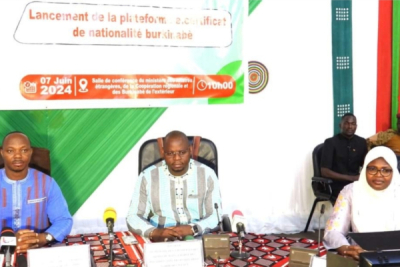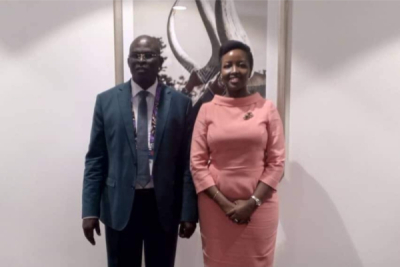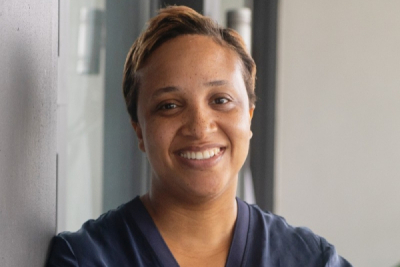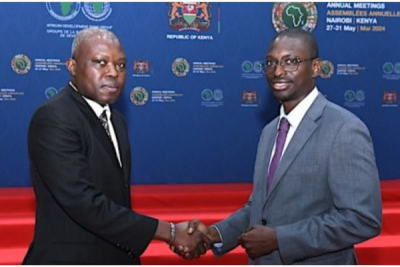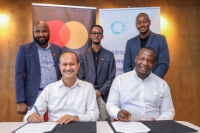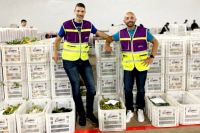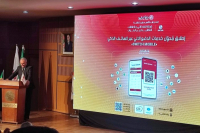In Africa, an increasing number of women are balancing their professional careers with motherhood. This dual role often proves complicated for many, which has inspired tech entrepreneurs to create a solution.
Nigerian startup Preggify has developed an e-health solution designed to offer comprehensive care for expectant mothers throughout their pregnancy journey. Co-founded by Ifunanya Lilian Igweze and Daniel Temitayo in 2022, this Lagos-based enterprise envisions a world where pregnancy and childcare do not hinder women’s professional advancement.
"Preggify is a health platform that provides middle and high-income African women in their reproductive years with easy, affordable, and accessible maternal care. Our cutting-edge technology empowers women to access personalized medical support and resources, from pre-pregnancy to post-pregnancy, with confidence and ease," the startup states.
While Preggify does not offer a mobile app, it is accessible via a web browser. Users can register by providing personal information such as their first and last names, email address, phone number, date of birth, and gender. Following this step, they receive a one-time password (OTP) via email to log into the platform.
Preggify provides both a premium and a free version, where users can find support from a community of pregnant women or those who have experienced multiple pregnancies. The startup offers a digital space where career-oriented women can access tailored resources and support to balance motherhood and their professional lives.
The platform offers a variety of features, including a food journal, weekly live classes, pregnancy fitness sessions, support before and after cesarean sections, education on episiotomy care, breastfeeding assistance, and mental support. Preggify is also in the process of integrating healthcare professionals and facilitating virtual doctor appointments on its platform.
Adoni Conrad Quenum
Niger is currently developing a digital health master plan to optimize healthcare management. To this end, a workshop was held on Wednesday, June 5 in Niamey, presided over by the Minister of Public Health, Population, and Social Affairs, Colonel-Major Garba Hakimi.
Burkina Faso unveiled its new e-certificate platform for Certificates of Citizenship on Friday, June 7, in the capital Ouagadougou. The platform, accessible at https://ecertificat-nationalite.gov.bf/, is designed to streamline the application process for Burkinabe citizens by allowing them to submit and track their requests online.
Rwandan Minister of Telecommunications and Innovation Paula Ingabire met with her Chadian counterpart, Minister of Communications, Digital Economy, and Digitalization of Administration Boukar Michel, on the sidelines of the ongoing ICANN80 summit (Internet Corporation for Assigned Names and Numbers) in Kigali, Rwanda, on Sunday, June 9. The discussions focused on bolstering bilateral cooperation in the digitalization sphere. Both ministers expressed their commitment to formalizing this collaboration through a memorandum of understanding, paving the way for Rwanda to share its digitalization expertise and experience with Chad.
She aims to help African traders and those around the world at large prosper. To achieve this, she leverages technology to simplify transactions between the various parties involved in buying and selling processes.
Anu Adedoyin Adasolum (photo) is a Nigerian entrepreneur and the co-founder and CEO of Sabi, a startup that leverages technology to help traders grow their businesses.
Founded in 2021, her company, Sabi, has built a robust infrastructure for the distribution of physical goods and merchandise. Through its digital platform, it provides agents, traders, wholesalers, aggregators, distributors, and manufacturers with the necessary tools to enhance their capabilities and grow their businesses.
This digital infrastructure facilitates access to order fulfillment, logistics, business management tools, a business-to-business (B2B) marketplace, data, and financial services. In essence, Sabi has become a one-stop shop for everyone involved in buying and selling goods.
In just three years, Sabi has experienced exponential growth, demonstrating the relevance of its business model. With 250,000 registered users and 15,000 monthly facilitated orders, the company has established itself as a key player in Nigeria, its primary market. Buoyed by this success, Sabi has expanded its operations to South Africa and aims to replicate this success in other countries like Tanzania and Senegal.
Anu Adedoyin Adasolum graduated from SOAS University of London with a bachelor's degree in economics and politics in 2009. She also holds a master's degree in management, organization, and governance from the London School of Economics and Political Science.
Before founding Sabi, she held various positions of responsibility within renowned companies. In 2011, she began as an operations planner at Dangote Industries Ltd. In 2012, she joined KPMG Nigeria as a business analyst.
In 2014, she was hired by the e-commerce startup Jumia in Nigeria, where she served as head of sourcing and internal procurement, head of vendor acquisition, and vice president of JForce, Jumia's direct sales division. Between 2018 and 2021, she worked at Rensource Energy, a solar energy provider, where she served successively as general manager and chief operating officer.
Melchior Koba
The African Development Bank, in its efforts to support African countries in their digital transformation process, is entering into various strategic agreements.
The African Development Bank (AfDB) and U.S. tech giant Intel have joined forces to equip 3 million Africans and 30,000 civil servants with artificial intelligence (AI) skills, according to a press release issued on June 7. The partnership was finalized during the recent AfDB Annual Meetings in Nairobi.
"With advancements in digital technology, our world is rapidly evolving, and so is our youthful population, projected to reach 830 million by 2050. To develop skills on a large scale and at the necessary speed, we need everyone's cooperation," said Ousmane Fall, Acting Director of Industrial and Trade Development at the AfDB. (Photo, Right)
"The Bank is thrilled to collaborate with Intel to work towards this shared commitment. Together, we are shaping the digital future of Africa and empowering our youth," Fall added.
Acquiring digital skills has become essential with the ongoing technological revolution worldwide. African countries are not left out of this revolution, and with the support of various institutions such as the AfDB, numerous projects are being implemented. In May 2024, the AfDB partnered with the American company Mastercard to implement the MADE (Mobilising Access to the Digital Economy) initiative, which aims to provide digital access to 100 million African people and businesses over the next decade.
This new initiative will, among other things, accelerate growth and productivity by positioning Africans as active contributors to the fourth industrial revolution in key sectors such as agriculture, health, and education, thereby disrupting traditional growth cycles.
Adoni Conrad Quenum
With the rise of digitalization, content creators have become an influential segment of the digital economy. However, they face challenges in financial management. Addressing these unique financial needs is crucial for African development, making initiatives like this highly significant.
Mastercard has invested $2.04 million in a partnership with Wowzi, Africa’s influencer marketing platform, and Masria Digital Payments (MDP), Wowzi announced on June 6. The five-year initiative aims to enhance financial management for content creators, providing them with advanced digital tools to manage their earnings.
“Our objective is to empower these digital trailblazers with the financial tools and security they need to thrive in the dynamic payments landscape. This investment aligns with our vision to promote financial inclusion and drive innovation in an ever-evolving digital economy,” said Shehryar Ali, senior vice president and country manager for East Africa and Indian Ocean Islands at Mastercard.
Mastercard’s investment supports the gig economy by offering digital card products (watch and ring cards) for secure and convenient transactions. These cards will allow content creators to receive payments directly from brands, fans, or sponsors, bypassing traditional gateways. Meanwhile, Wowzi will leverage its network to boost content creators' visibility and profitability and MDP will manage the technical aspects, ensuring secure and seamless transactions.
The IFC report "e-Conomy Africa 2020" reveals that Africa's internet economy could reach $180 billion by 2025, contributing 5.2% to the continent's GDP. This underscores the importance of Mastercard's investment in digital solutions for African content creators. This collaboration marks a significant step towards the future of digital finance, combining creativity and technology to empower content creators in Africa.
Hikmatu Bilali
Moroccan agricultural technology company YoLa Fresh announced on Thursday, May 30, that it has secured $7 million in a funding round.
The company, which connects farmers with fruit and vegetable retailers, will utilize the fresh capital to bolster its Moroccan operations, further develop its technology platform, and prepare for international expansion by 2026.
In Africa, financial inclusion has become a critical issue for many governments and financial regulators. Initiatives are being implemented to enhance access to financial services and make them available to a larger segment of the population.
Algeria's mobile payment interoperability project is now operational, the government announced on Monday, June 3. The initiative, facilitated by a new switch called "Switch mobile," allows customers of Algerian banks and Algeria Post to make instant interbank transfers and account-to-account payments using QR codes.
Speaking on the significance of these innovations, Finance Minister Laaziz Fayed stated that they "are the culmination of a work plan and a meticulous strategy launched by the public authorities as part of the implementation of the provisions of the monetary and banking law in its development aspect."
According to Laaziz Fayed, the launch of this service marks the second step in the process of modernizing and developing payment methods by providing a switch for payments and transfers that connects all bank applications and those of Algeria Post to mobile. It aligns with the National Electronic Payment Strategy, which aims to enhance financial inclusion in Algeria.
The government plans to further promote mobile payment services across the country through targeted campaigns. The launch is expected to significantly improve e-payment efficiency and security in Algeria.
According to official figures, the number of mobile transactions between January and March this year reached more than 13 million, with a value exceeding 9 billion Algerian dinars (66.9 million USD). The number of interbank cards and Algeria Post cards was estimated at over 17 million as of March 31, while the number of ATMs reached over 3,868, recording more than 45.9 million transactions for a total amount exceeding 859 billion Algerian dinars during the first quarter.
Samira Njoya
The Covid-19 pandemic accelerated the development of this young startup, which was exploring the Togolese market to provide digital solutions for the event industry. Since then, it has steadily grown and has been involved in over 150 events since its launch.
Klumer, a digital solution developed by Eods Communication, allows users to purchase event tickets online from their computer or smartphone. The startup, based in Lomé, was founded in 2018 by Fiacre Dagbegnon.
"Klumer is an event platform with a complete ecosystem designed to provide optimal support to event organizers in achieving their audience targeting goals," says the startup.
The application is available on both iOS and Android and has already been downloaded over a thousand times, according to Play Store statistics. After downloading, users create an account to access Klumer's services. Besides the e-Ticket service, which functions as an online ticketing system allowing users to purchase tickets for various events directly through the Klumer platform, the startup also offers e-Voting, e-Collect, and e-Score services.
As the names suggest, e-Voting enables the organization of online votes with a single click; e-Collect helps conduct transparent fundraising and social donations; and e-Scoring facilitates the management of competitive events with a digital scoreboard.
"Klumer was developed following Facebook and Instagram’s style. Today, we have nothing to envy from what developers in Silicon Valley have achieved in social network development. The only difference is in their logistics, which we do not yet have," Fiacre Dagbegnon told local business media Togo First in February 2023.
The Togolese startup boasts over 810,000 users and has covered more than 150 events since its launch. It was selected, along with nine other Togolese startups, to participate in the second edition of the Gitex Africa technology fair in Marrakech, Morocco, from May 29 to 31.
Adoni Conrad Quenum
More...
The Tunisian government views 5G technology as a means to accelerate the digital transformation of various economic sectors, including agriculture, education, and transportation. The executive has set the launch date for ultra-high-speed internet in the country for November 2024.
Tunisia and South Korea agreed to collaborate on the deployment of 5G technology, according to a Memorandum of Understanding (MoU) signed by Nizar Ben Neji, Tunisia's Minister of Communication Technologies, and his South Korean counterpart, Lee Jong Ho.
The signing took place on the sidelines of the Global ICT Leaders Forum in Seoul, held alongside the first Korea-Africa Summit on June 4-5.
This MoU aligns with Tunisia's recently unveiled 5G roadmap. The roadmap targets September 2024 for granting licenses and November 2024 for the commercial launch of 5G services. In addition, Tunisian telecom operators have already conducted preliminary tests of the next-generation mobile technology.
The 5G partnership aligns with Tunisia's "National Digital Transformation Strategy 2025," which prioritizes accelerating administrative digitization, securing cyberspace, ensuring digital sovereignty, and fostering trust for successful digitalization projects.
The implementation of 5G is expected to pave the way for the development of smart homes, smart cities, e-learning, e-government, 3D video, telemedicine, virtual and augmented reality, streaming services, artificial intelligence applications, and the Internet of Things (IoT).
Isaac K. Kassouwi
A South Korean delegation met with President Dr. Mokgweetsi Masisi at the 2024 Korea-Africa summit in Seoul, Botswana’s presidency revealed June 5.
The delegation discussed establishing an ICT industry base and fostering digital government in Botswana, aiming to share South Korea's successful strategies and explore potential collaborations.
This meeting highlights efforts to strengthen bilateral relations and enhance technological cooperation between South Korea and Botswana.
Agriculture is a vital sector for African economies. With the digital transformation amidst a technological revolution on the continent, digitizing the agricultural sector has become crucial for many countries across the continent.
The Ethiopian Agricultural Transformation Institute (ATI) signed a Memorandum of Understanding (MoU) with Digital Green, a U.S.-based non-profit focused on digitizing agriculture, to empower farmers through digital solutions.
The announcement, made by Digital Green on Facebook on June 2, outlines a five-year collaboration aimed at maximizing agricultural and socio-economic benefits for farmers, particularly women and youth, in the operational regions of both organizations.
The initiative will establish a knowledge-sharing platform built on FarmStack, an open-source data and content-sharing network. This platform will leverage APIs, URLs, and CKAN integrations for seamless information exchange.
"We're thrilled to announce that we have signed a Memorandum of Understanding (MOU) with Ethiopian Agricultural Transformation Agency to maximize the agricultural and socio-economic benefits for farmers, women, and youth in the operational regions and Woredas of both organizations," Digital Green wrote on their Facebook page. "This five-year MOU aims to outline collaborative efforts in digital agriculture, youth job creation, women empowerment, market information systems, resource mobilization, and data sharing."
Ethiopia's digital transformation strategy includes digitizing the agricultural sector. The government partnered with local agritech firm Lersha to create digital profiles for over 1 million small-scale farmers, granting them access to various digital agriculture services.
"Together, we will implement initiatives to digitize farmer registries, enhance digital agricultural extension channels, and improve market access, ultimately benefiting farmers, women, and youth across Ethiopia," Digital Green added.
Adoni Conrad Quenum
Entrepreneurs using data and technology to tackle social issues in Africa are invited to join the 'Think Like an Investor' program, which seeks innovative digital social innovations (DSIs) with significant impact in areas like e-health, digital inclusion, climate change, financial inclusion, connectivity, and governance.
The program, announced on the official Facebook page of the Delegation of the European Union to Namibia on June 5, offers investment readiness training, mentorship from professionals in Europe and Africa, and networking opportunities at industry events.
Eligible applicants must be from South Africa, Botswana, Tanzania, Zambia, Namibia, Kenya, or Senegal, and must be proficient in English. Applications are open till August 4.




